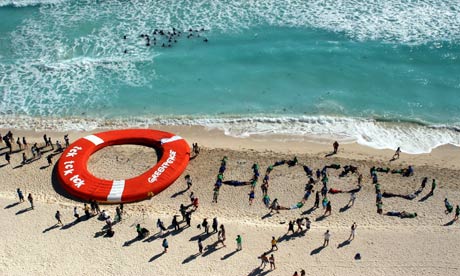
From Life-Support to Life-Line
 So the car crash somehow didn’t happen. Somehow the groundhog talks managed to conjure up a deal in the last twenty four hours. A diplomatic rabbit was pulled by the Mexican hosts out of the hat.
So the car crash somehow didn’t happen. Somehow the groundhog talks managed to conjure up a deal in the last twenty four hours. A diplomatic rabbit was pulled by the Mexican hosts out of the hat.
It is a deal of sorts, that keeps the show on the road, at least for now. “Confidence is back,” announced Mexico’s President Felipe Calderon at the conclusion of the talks at 3 am. “Hope has returned.”
Hope has returned in the form of a climate fund that will channel as much as $100 billion a year in aid to developing nations by 2020, that will supposedly protect forests (although the mechanism is believed by many to be flawed) and that outlines methods to verify cuts in fossil fuel emissions.
But what is more important, the Cancun agreement is being seen as the first real step toward building an international deal, not just with the countries governed by the Kyoto Protocol.
“This is way beyond what we were expecting,” argued British Climate Secretary Chris Huhne “It is a really important moment, a turning point in the long-running saga of international climate change negotiations.”
Geoffrey Lean, writing in the Telegraph, called it the biggest breakthrough in climate talks in a decade. “ Life is unexpectedly starting to surge back into the world’s moribund bid to avert runaway global warming, after the surprising success of the latest climate summit in this Mexican seaside resort at the weekend.”
But it is not difficult to pick apart the Cancun deal. Many argued it was the thought of embarrassment of a second failed summit that forced through a deal. And such was the low expectation, that any deal is seen as a success.
The deal is fundamentally weak. It is only a stepping stone to something bigger. “The UN climate talks are off the life-support machine,” said Tim Gore of Oxfam. “The agreement falls short of the emissions cuts that are needed, but it lays out a path to move towards them.”
“The outcome wasn’t enough to save the planet,” said Alden Meyer of the Union of Concerned Scientists. “But it did restore the credibility of the United Nations as a forum where progress can be made.”
The Global Wind Energy Council said “None of the fundamental political, legal and architectural issues that still must be resolved in order to establish an effective global climate regime have been solved”.
Asad Rehman, International Climate Campaigner, Friends of the Earth, said: “The world needed strong and determined action to tackle climate change in Cancún – the outcome is a weak and ineffective agreement but at least it gives us a small and fragile lifeline.
Other dissent is not far away: “Developing countries have left another Climate Change summit feeling their pleas were simply not being heard or listened to by the richer nations most responsible for the world’s climate crisis,” wrote one Chinese website. It continued: “The scores of small island states most at Climate Change risk had high hopes for Cancun; now they’re finding out, once more, that they were probably just hoping against hope.”
The reality is that no new targets for curbing greenhouse gases were set, and debate on the future of the Kyoto Protocol was put off until the next meeting in Durban, South Africa, in December 2011.
Which means the pressure on the Durban Summit will be intense as it will be the last practical opportunity to seal a new set of Kyoto pledges.
Some are even arguing that a new worldwide climate treaty may be 20 years away.
Tim Wirth, who in 1997 led the U.S. delegation in Kyoto argues: “We have a dysfunctional Congress and an administration without policy. The U.S. doesn’t have an energy strategy. You can’t sign up to an international treaty unless you know what you are going to do at home.”
The problem now for Obama is that climate legislation probably can’t win congressional approval until 2013 at the earliest. That means that Kyoto will expire before the US sets legislation to back up its commitments on cutting emissions.
This means developing countries will not pledge cuts of their own. That leaves islanders from nations such as Kiribati in the south Pacific, in trouble.
President Anote Tong says “The negotiating process will carry on for the next few decades,” Tong said. “It’s going to be too late for many countries. It’s about the survival of people.”
